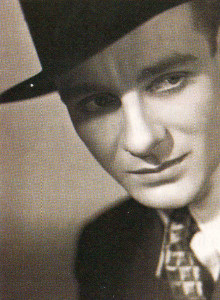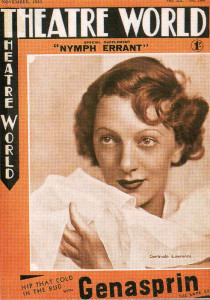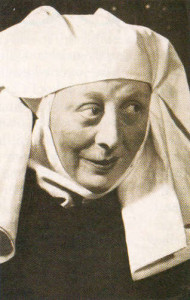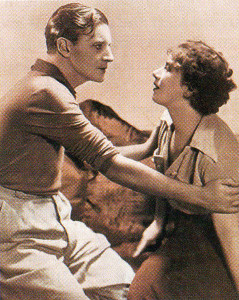
I recently switched on Radio Four to hear the never-to-be-forgotten voice of Gertrude Lawrence singing Experiment. I was immediately transported back to the years before the Second World War when I was an ardent theatregoer.
In those days, the working week consisted of five and a half days. Having finished my half-day one Saturday, I wandered along the Strand to the Adelphi Theatre to see if there were any seats available for the matinee of Nymph Errant. I was lucky so, after a quick snack at Lyons Corner House, I settled into a comfortable seat and waited for the curtain to rise.
The programme described it as Charles B. Cochran’s production of a Play with Music by Romney Brent from the Novel byjames Laver, with Lyrics and Music by Cole Porter. The scenes switched from Oxford to Lausanne, Paris, Venice, Athens, Smyrna, a harem in Turkey, where Elisabeth Welch sang that unforgettable song Solomon, and eventually back to Oxford. Gertrude Lawrence
gave a rivetting performance, appearing in almost every scene (there were 13 in all) and in the last scene she sang Experiment.
During the 1930s, Charles Cochran’s name was outside many theatres and a number of his Young Ladies graduated from the chorus to become leading ladies. It was the golden age of the musical, with Ivor Novello firmly ensconced at Drury Lane, where Glamorous Night, Crest of the Wave and The Dancing Years played to packed houses.
Noel Coward gave us Cavalcade and followed that with Bitter Sweet and Operette at His Majesty’s in Haymarket, then those nine fascinating one-act plays with Music Tonight at 8.30 at the Phoenix Theatre.
Being an inveterate hoarder, I have an old trunk full of programmes of those days, as well as several years’ copies of Theatre World and I sometimes go through them and indulge
in a little nostalgia to relive some of the wonderful productions I saw in those days.
Who could forget John Gielgud’s time at the New Theatre in St. Martin’s Lane, with a company including Peggy Ashcroft (a delightful Juliet), Laurence Olivier, and Edith Evans, or Emlyn Williams with Angela Baddeley, Kathleen Harrison and Dame May Whitty in his own play Night Must Fall.
For those of us who saw The Corn is Green, it would be difficult to forget the fine performance of Dame Sybil Thorndike as the schoolmistress.
There were so many excellent productions in the West End before the Second World War and it was a privilege to have lived during that time and to remember one’s youthful enthusiasm for the theatre when visits are no longer possible.
Betty Pitcher











